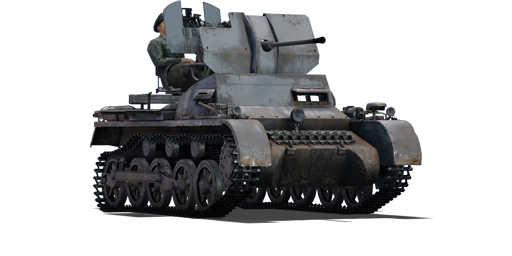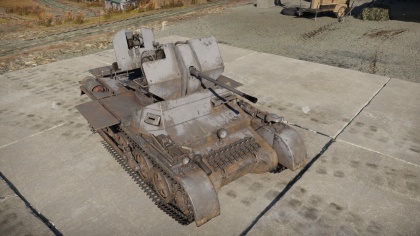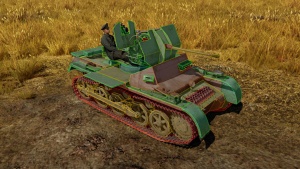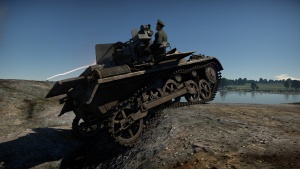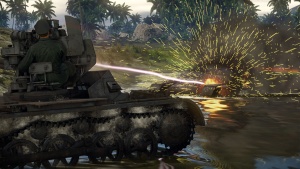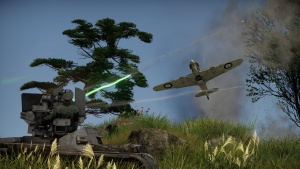Difference between revisions of "Flakpanzer I"
Jareel_Skaj (talk | contribs) |
(Edits) |
||
| Line 2: | Line 2: | ||
== Description == | == Description == | ||
| − | <!--In the description, the first part should be about the history of the creation and combat usage of the vehicle, as well as its key features. In the second part, tell the reader about the ground vehicle in the game. Insert a screenshot of the vehicle, so that if the novice player does not remember the vehicle by name, he will immediately understand what kind of vehicle the article is talking about.--> | + | <!-- ''In the description, the first part should be about the history of the creation and combat usage of the vehicle, as well as its key features. In the second part, tell the reader about the ground vehicle in the game. Insert a screenshot of the vehicle, so that if the novice player does not remember the vehicle by name, he will immediately understand what kind of vehicle the article is talking about.'' --> |
[[File:GarageImage_{{PAGENAME}}.jpg|420px|thumb|left]] | [[File:GarageImage_{{PAGENAME}}.jpg|420px|thumb|left]] | ||
| − | {{ | + | {{Break}} |
| − | The '''{{Specs|name}}''' is a rank {{Specs|rank}} German self-propelled anti-aircraft vehicle {{Battle-rating}}. It was introduced | + | The '''{{Specs|name}}''' is a rank {{Specs|rank}} German self-propelled anti-aircraft vehicle {{Battle-rating}}. It was introduced during the Closed Beta Test for Ground Forces before [[Update 1.41]]. |
== General info == | == General info == | ||
=== Survivability and armour === | === Survivability and armour === | ||
| − | <!--Describe armour protection. Note the most well protected and key weak areas. Appreciate the layout of modules as well as the number and location of crew members. Is the level of armour protection sufficient, is the placement of modules helpful for survival in combat? | + | <!-- ''Describe armour protection. Note the most well protected and key weak areas. Appreciate the layout of modules as well as the number and location of crew members. Is the level of armour protection sufficient, is the placement of modules helpful for survival in combat? If necessary use a visual template to indicate the most secure and weak zones of the armour.'' --> |
| − | |||
| − | If necessary use a visual template to indicate the most secure and weak zones of the armour.--> | ||
[[File:Armor_{{PAGENAME}}.jpg|thumb|left|Note the exposed gunner position]] | [[File:Armor_{{PAGENAME}}.jpg|thumb|left|Note the exposed gunner position]] | ||
| − | The Flakpanzer I has | + | The Flakpanzer I has exceptionally poor survivability. Even frontally, where the protection is at its best, it can be destroyed with a machine gun. The 7 mm gun shield can be penetrated even by 6.5 mm tracer rounds, while anything with 6 mm of penetration can penetrate the driver's optics. If that isn't enough, the Flakpanzer is also hull-breakable, so early-rank vehicles firing HEAT or HE rounds are able to one-shot you. Furthermore - artillery strikes should be avoided at all cost, as they have a very wide shrapnel radius, which combined with a very exposed gunner means certain loss even if the shell explodes meters away. |
As far as crew skills go, the exposed gunner the plays a role of the gunner, commander and loader, with all the associated crew roles. | As far as crew skills go, the exposed gunner the plays a role of the gunner, commander and loader, with all the associated crew roles. | ||
| Line 26: | Line 24: | ||
|- | |- | ||
|} | |} | ||
| + | |||
=== Mobility === | === Mobility === | ||
<!-- ''Write about the mobility of the ground vehicle. Estimate the specific power and manoeuvrability, as well as the maximum speed forwards and backwards.'' --> | <!-- ''Write about the mobility of the ground vehicle. Estimate the specific power and manoeuvrability, as well as the maximum speed forwards and backwards.'' --> | ||
[[File:Flakpanzer I hillclimb.jpg|thumb|right|Flakpanzer I can access locations impossible to reach with wheeled AA]] | [[File:Flakpanzer I hillclimb.jpg|thumb|right|Flakpanzer I can access locations impossible to reach with wheeled AA]] | ||
| − | {{tankMobility|abMinHp= 81|rbMinHp= 50 | + | {{tankMobility|abMinHp=81|rbMinHp=50}} |
| − | The mobility of the {{PAGENAME}} is the worst among contemporary AA systems, at 31 km/h forward (RB) and -6 km/h backwards, it's especially troublesome on the flat, hard surfaces where other AA guns of the BR can often do over double the maximum speed. Where it has an advantage is in | + | The mobility of the {{PAGENAME}} is the worst among contemporary AA systems, at 31 km/h forward (RB) and -6 km/h backwards, it's especially troublesome on the flat, hard surfaces where other AA guns of the BR can often do over double the maximum speed. Where it has an advantage is in extremely rough terrain or hill climbing, where its tracks and a good power-to-weight ratio (10.36 hp/ton fully upgraded in RB) provide a noticeable advantage over the wheeled vehicles, though it still loses to the tracked AAs such as the Swedish [[Pvlvv fm/42]] (14.17 hp/ton, max speed of 49 km/h, fully upgraded in RB). |
== Armaments == | == Armaments == | ||
=== Main armament === | === Main armament === | ||
| − | <!--Give the reader information about the characteristics of the main gun. Assess its effectiveness in a battle based on the reloading speed, ballistics and the power of shells. Do not forget about the flexibility of the fire, that is how quickly the cannon can be aimed at the target, open fire on it and aim at another enemy. Add a link to the main article on the gun: <code><nowiki>{{main|Name of the weapon}}</nowiki></code>. Describe in general terms the ammunition available for the main gun. Give advice on how to use them and how to fill the ammunition storage.--> | + | <!-- ''Give the reader information about the characteristics of the main gun. Assess its effectiveness in a battle based on the reloading speed, ballistics and the power of shells. Do not forget about the flexibility of the fire, that is how quickly the cannon can be aimed at the target, open fire on it and aim at another enemy. Add a link to the main article on the gun: <code><nowiki>{{main|Name of the weapon}}</nowiki></code>. Describe in general terms the ammunition available for the main gun. Give advice on how to use them and how to fill the ammunition storage.'' --> |
| − | {{main| | + | {{main|FlaK38 (20 mm)}} |
| − | The {{PAGENAME}} is armed with the 20 mm | + | The {{PAGENAME}} is armed with the 20 mm FlaK38 cannon, which turns out to be fantastic for a cannon of this rank. It boasts a high fire rate, 20-round magazines, useful HE rounds to shred low-flying planes, 46 mm penetration AP-I, and 64 mm pen APCR. The gun will destroy most enemies it can encounter with the APCR belt, and can easily be used even if uptiered. The gun offers excellent handling, being able to quickly guide on targets and has just enough ammunition to either cripple or outright destroy most hostile tanks. It's not as great against aircraft, but using shorter, controlled bursts one can achieve much better results than by spray-and-pray |
{| class="wikitable" style="text-align:center" width="100%" | {| class="wikitable" style="text-align:center" width="100%" | ||
|- | |- | ||
| − | ! colspan=" | + | ! colspan="6" | [[FlaK38 (20 mm)|20 mm FlaK38]] || colspan="5" | Turret rotation speed (°/s) || colspan="4" | Reloading rate (seconds) |
|- | |- | ||
| − | ! Mode | + | ! Mode !! Capacity (Belt) !! Fire rate !! Vertical !! Horizontal !! Stabilizer |
| − | ! Capacity | + | ! Stock !! Upgraded !! Full !! Expert !! Aced |
| − | ! Vertical | + | ! Stock !! Full !! Expert !! Aced |
| − | ! Horizontal | ||
| − | ! Stabilizer | ||
| − | ! Stock | ||
| − | ! Upgraded | ||
| − | ! Full | ||
| − | ! Expert | ||
| − | ! Aced | ||
| − | ! Stock | ||
| − | ! Full | ||
| − | ! Expert | ||
| − | ! Aced | ||
|- | |- | ||
! ''Arcade'' | ! ''Arcade'' | ||
| − | | rowspan="2" | 320 || rowspan="2" | -10°/+87° || rowspan="2" | ±180° || rowspan="2" | | + | | rowspan="2" | 320 (20) || rowspan="2" | 480 || rowspan="2" | -10°/+87° || rowspan="2" | ±180° || rowspan="2" | N/A || 30.82 || 42.66 || 51.79 || 57.28 || 60.94 || rowspan="2" | 3.90 || rowspan="2" | 3.45 || rowspan="2" | 3.18 || rowspan="2" | 3.00 |
|- | |- | ||
! ''Realistic'' | ! ''Realistic'' | ||
| − | | 20.83 || 24. | + | | 20.83 || 24.50 || 29.75 || 32.90 || 35.00 |
| + | |- | ||
| + | |} | ||
| + | |||
| + | ==== Ammunition ==== | ||
| + | * '''Default:''' {{Annotation|API-T|Armour-piercing incendiary tracer}}{{-}}{{Annotation|HEFI-T|High-explosive fragmentation incendiary tracer}}{{-}}{{Annotation|HEFI-T|High-explosive fragmentation incendiary tracer}}{{-}}{{Annotation|HEFI-T|High-explosive fragmentation incendiary tracer}} | ||
| + | * '''Sprgr.:''' {{Annotation|HEFI-T|High-explosive fragmentation incendiary tracer}} | ||
| + | * '''PzGr:''' {{Annotation|API-T|Armour-piercing incendiary tracer}} | ||
| + | * '''PzGr 40:''' {{Annotation|HVAP-T|High-velocity armour-piercing tracer}}{{-}}{{Annotation|API-T|Armour-piercing incendiary tracer}} | ||
| + | {| class="wikitable sortable" style="text-align:center" width="100%" | ||
| + | ! colspan="7" | Penetration statistics | ||
| + | |- | ||
| + | ! rowspan="2" data-sort-type="text" | Ammunition | ||
| + | ! colspan="6" | '''Penetration @ 0° Angle of Attack (mm)''' | ||
| + | |- | ||
| + | ! 10 m !! 100 m !! 500 m !! 1,000 m !! 1,500 m !! 2,000 m | ||
| + | |- | ||
| + | | Default || 36 || 34 || 26 || 19 || 14 || 10 | ||
| + | |- | ||
| + | | Sprgr. || 2 || 2 || 2 || 2 || 2 || 2 | ||
| + | |- | ||
| + | | PzGr || 36 || 34 || 26 || 19 || 14 || 10 | ||
| + | |- | ||
| + | | PzGr 40 || 64 || 63 || 26 || 19 || 14 || 10 | ||
|- | |- | ||
|} | |} | ||
| − | + | ||
==== [[Ammo racks]] ==== | ==== [[Ammo racks]] ==== | ||
| − | + | [[File:Ammoracks_{{PAGENAME}}.jpg|right|thumb|x250px|[[Ammo racks]] of the {{PAGENAME}}]] | |
{| class="wikitable" style="text-align:center" | {| class="wikitable" style="text-align:center" | ||
|- | |- | ||
| Line 77: | Line 88: | ||
| '''16''' || 1 ''(+15)'' || Yes | | '''16''' || 1 ''(+15)'' || Yes | ||
|- | |- | ||
| − | |}{{ | + | |} |
| + | |||
| + | The way ammo racks work on the {{PAGENAME}} is very unusual. There are no ammo racks for individual cartridges of ammunition. Instead, there's a permanent ammo rack until the final cartridge is loaded into the gun, at which point all ammo racks disappear, including the one visible to be loaded into the gun, while there's still 20 bullets ready to be fired. | ||
== Usage in battles == | == Usage in battles == | ||
| − | <!--Describe the tactics of playing in the vehicle, the features of using vehicles in the team and advice on tactics. Refrain from creating a "guide" - do not impose a single point of view but instead give the reader food for thought. Describe the most dangerous enemies and give recommendations on fighting them. If necessary, note the specifics of the game in different modes (AB, RB, SB).--> | + | <!-- ''Describe the tactics of playing in the vehicle, the features of using vehicles in the team and advice on tactics. Refrain from creating a "guide" - do not impose a single point of view but instead give the reader food for thought. Describe the most dangerous enemies and give recommendations on fighting them. If necessary, note the specifics of the game in different modes (AB, RB, SB).'' --> |
| − | [[File:Flakpanzer I AntiTank.jpg|thumb|right|Flakpanzer I is perfectly capable of dealing with enemy tanks, with PzGr 40 being able to penetrate tanks through frontal | + | [[File:Flakpanzer I AntiTank.jpg|thumb|right|Flakpanzer I is perfectly capable of dealing with enemy tanks, with PzGr 40 being able to penetrate tanks through frontal armour]] |
| − | The Flakpanzer I is extremely versatile and potent vehicle, working largely as a glass cannon on the battlefield. It's best used as a flanker and tank-destroyer with situational use against unaware patrolling aircraft. The chassis is not particularly stable, making it more tricky to shoot on a move and | + | The Flakpanzer I is an extremely versatile and potent vehicle, working largely as a glass cannon on the battlefield. It's best used as a flanker and tank-destroyer with situational use against unaware patrolling aircraft. The chassis is not particularly stable, making it more tricky to shoot on a move and easy to roll over. Turret traverse is very fast, allowing it to react to new threats and often fire the crippling shots before the enemy fully emerges from cover. While it can essentially spray 20 mm rounds at targets, it is advisable to maintain trigger control and conserve ammunition, firing only when needed because reload time between ammunition magazines is punishing, often being longer than hostile vehicles', giving them a better chance to take a second shot if the first one missed. |
| + | |||
| + | While the gun is great, there are some enemies it encounters that you should straight-up avoid if at all possible. These are the [[Valentine Mk I]], [[B1 bis]], and [[B1 ter]]. If used in 1.7 lineups, the [[Matilda Mk II]], [[T-28E]], and [[M3 Lee]]/[[Grant I|Grant]] are also significant threats. The Flakpanzer I can opportunistically destroy the B1 bis, T-28E, and M3 Lee variations in some situations, but the B1 ter, Valentine, and Matilda are totally immune even to the APCR belt outside of lucky hits in the turret ring. | ||
| − | |||
=== Modules === | === Modules === | ||
{| class="wikitable" | {| class="wikitable" | ||
| Line 104: | Line 118: | ||
| FPE | | FPE | ||
| Adjustment of Fire | | Adjustment of Fire | ||
| − | | | + | | |
|- | |- | ||
| III | | III | ||
| Line 121: | Line 135: | ||
|- | |- | ||
|} | |} | ||
| − | After researching FPE and Parts one should prioritize reaching PzGr 40 as soon as possible. | + | |
| + | After researching FPE and Parts one should prioritize reaching PzGr 40 as soon as possible. The path towards it should lead through PzGr (as it significantly increases anti-tank capability over the Default ammunition belt until the PzGr 40 is researched) and Crew Replenishment, otherwise leaving it largely up to personal preference, as the {{PAGENAME}} largely features good mobility and accuracy. | ||
[[File:Flakpanzer I AAduty.jpg|thumb|right|Flakpanzer I was designed as an anti-aircraft gun]] | [[File:Flakpanzer I AAduty.jpg|thumb|right|Flakpanzer I was designed as an anti-aircraft gun]] | ||
| + | |||
=== Pros and cons === | === Pros and cons === | ||
| − | <!--Summarise and briefly evaluate the vehicle in terms of its characteristics and combat effectiveness. Mark its pros and cons in a bulleted list. Try not to use more than 6 points for each of the characteristics. Avoid using categorical definitions such as "bad", "good" and the like - use substitutions with softer forms such as "inadequate" and "effective".--> | + | <!-- ''Summarise and briefly evaluate the vehicle in terms of its characteristics and combat effectiveness. Mark its pros and cons in a bulleted list. Try not to use more than 6 points for each of the characteristics. Avoid using categorical definitions such as "bad", "good" and the like - use substitutions with softer forms such as "inadequate" and "effective".'' --> |
'''Pros:''' | '''Pros:''' | ||
| Line 139: | Line 155: | ||
== History == | == History == | ||
| − | <!-- ''Describe the history of the creation and combat usage of the | + | <!-- ''Describe the history of the creation and combat usage of the vehicle in more detail than in the introduction. If the historical reference turns out to be too long, take it to a separate article, taking a link to the article about the vehicle and adding a block "/History" (example: <nowiki>https://wiki.warthunder.com/(Vehicle-name)/History</nowiki>) and add a link to it here using the <code>main</code> template. Be sure to reference text and sources by using <code><nowiki><ref></ref></nowiki></code>, as well as adding them at the end of the article with <code><nowiki><references /></nowiki></code>. This section may also include the vehicle's dev blog entry (if applicable) and the in-game encyclopedia description (under <code><nowiki>=== In-game description ===</nowiki></code>, also if applicable).'' --> |
=== In-game description === | === In-game description === | ||
In early 1940, the ordnance logistics department directed the Alkett and Daimler-Benz companies to develop a weapon mount with a circular field of fire, to be mounted on the chassis of the Pz.Kpfw. I Ausf. A tank. The outdated chassis was used since the Germans were intensely seeking alternative ways to use chassis. | In early 1940, the ordnance logistics department directed the Alkett and Daimler-Benz companies to develop a weapon mount with a circular field of fire, to be mounted on the chassis of the Pz.Kpfw. I Ausf. A tank. The outdated chassis was used since the Germans were intensely seeking alternative ways to use chassis. | ||
| − | The Flakpanzer I had a hull, engine, transmission, and chassis which were similar to the Pz.Kpfw. I Ausf. A tank. In the modified turret box, in the place of the dismantled old turret, a 20 mm Flak 38 gun was installed on a platform. The gun had an operational fire rate of 220 rounds per minute and allowed the tank to effectively engage low-flying targets. This gun's vertical angle | + | The Flakpanzer I had a hull, engine, transmission, and chassis which were similar to the Pz.Kpfw. I Ausf. A tank. In the modified turret box, in the place of the dismantled old turret, a 20 mm Flak 38 gun was installed on a platform. The gun had an operational fire rate of 220 rounds per minute and allowed the tank to effectively engage low-flying targets. This gun's vertical angle could range from -10 to 87 degrees. |
| + | |||
| + | A total of 24 of these self-propelled anti-aircraft guns were built. Two more were built with 2 cm FlaK 30 guns. | ||
| − | |||
All of the Flakpanzer I guns which were released were used by the 614th flak battalion, which fought on the Eastern Front at Stalingrad. The guns were often used for direct fire support for ground troops, firing against ground targets. | All of the Flakpanzer I guns which were released were used by the 614th flak battalion, which fought on the Eastern Front at Stalingrad. The guns were often used for direct fire support for ground troops, firing against ground targets. | ||
| − | One of their flaws was that the trajectory calculation was cumbersome. In order to compensate for this, folding metal sides were added, but they did not do much to remedy the situation. Therefore, attacking ground targets required 5 people, but anti-aircraft fire required a crew of 8. The anti-aircraft vehicle was protected by nothing but its front armour. Most of the ammunition was placed in a specially designed Sd.Ah.51 trailer. Communication between vehicles was carried out using signal flags since the radio equipment had been dismantled. | + | One of their flaws was that the trajectory calculation was cumbersome. In order to compensate for this, folding metal sides were added, but they did not do much to remedy the situation. Therefore, attacking ground targets required 5 people, but anti-aircraft fire required a crew of 8. The anti-aircraft vehicle was protected by nothing but its front armour. Most of the ammunition was placed in a specially designed Sd.Ah.51 trailer. Communication between vehicles was carried out using signal flags, since the radio equipment had been dismantled. |
The vehicle's biggest advantage was that the 20 mm anti-aircraft guns could be dismantled and installed on a platform towed behind the vehicle. These dismantling and installation procedures took 4 and 6 minutes, respectively. | The vehicle's biggest advantage was that the 20 mm anti-aircraft guns could be dismantled and installed on a platform towed behind the vehicle. These dismantling and installation procedures took 4 and 6 minutes, respectively. | ||
| Line 155: | Line 172: | ||
== Media == | == Media == | ||
<!-- ''Excellent additions to the article would be video guides, screenshots from the game, and photos.'' --> | <!-- ''Excellent additions to the article would be video guides, screenshots from the game, and photos.'' --> | ||
| − | {{Youtube-gallery|nsAex8CWvrw|Flakpanzer I Tank Review | + | {{Youtube-gallery|nsAex8CWvrw|'''Flakpanzer I Tank Review''' - ''NUSensei''|6R-kCaAm1i8|'''Most OP German vehicle!! Flak Panzer 1''' - ''Pinhead_Plays''|sfcOCNd4F4Q|'''Misadventures with the Flakpanzer I''' - ''Herrman Thee German''}} |
== See also == | == See also == | ||
| Line 182: | Line 199: | ||
* [[wikipedia:Flakpanzer_I|[Wikipedia]Flakpanzer I]] | * [[wikipedia:Flakpanzer_I|[Wikipedia]Flakpanzer I]] | ||
* [https://tanks-encyclopedia.com/ww2/nazi_germany/Flakpanzer-I.php <nowiki>[Tanks Encyclopedia] Flakpanzer I</nowiki>] | * [https://tanks-encyclopedia.com/ww2/nazi_germany/Flakpanzer-I.php <nowiki>[Tanks Encyclopedia] Flakpanzer I</nowiki>] | ||
| − | |||
{{Germany anti-aircraft vehicles}} | {{Germany anti-aircraft vehicles}} | ||
Revision as of 16:19, 7 May 2020
Contents
Description
The Flakpanzer I Ausf. A is a rank I German self-propelled anti-aircraft vehicle
with a battle rating of 1.3 (AB/RB/SB). It was introduced during the Closed Beta Test for Ground Forces before Update 1.41.
General info
Survivability and armour
The Flakpanzer I has exceptionally poor survivability. Even frontally, where the protection is at its best, it can be destroyed with a machine gun. The 7 mm gun shield can be penetrated even by 6.5 mm tracer rounds, while anything with 6 mm of penetration can penetrate the driver's optics. If that isn't enough, the Flakpanzer is also hull-breakable, so early-rank vehicles firing HEAT or HE rounds are able to one-shot you. Furthermore - artillery strikes should be avoided at all cost, as they have a very wide shrapnel radius, which combined with a very exposed gunner means certain loss even if the shell explodes meters away.
As far as crew skills go, the exposed gunner the plays a role of the gunner, commander and loader, with all the associated crew roles.
| Armour | Front (Slope angle) | Sides | Rear | Roof |
|---|---|---|---|---|
| Hull | 13 mm (1° - 66°) | 13 mm | 13 mm | 8 - 0 mm |
| Turret | 7 mm | 0 mm | 0 mm | 0 mm |
Mobility
| Game Mode | Max Speed (km/h) | Weight (tons) | Engine power (horsepower) | Power-to-weight ratio (hp/ton) | |||
|---|---|---|---|---|---|---|---|
| Forward | Reverse | Stock | Upgraded | Stock | Upgraded | ||
| Arcade | 34 | 7 | 5.5 | 81 | 109 | 14.73 | 19.82 |
| Realistic | 31 | 6 | 50 | 57 | 9.09 | 10.36 | |
The mobility of the Flakpanzer I is the worst among contemporary AA systems, at 31 km/h forward (RB) and -6 km/h backwards, it's especially troublesome on the flat, hard surfaces where other AA guns of the BR can often do over double the maximum speed. Where it has an advantage is in extremely rough terrain or hill climbing, where its tracks and a good power-to-weight ratio (10.36 hp/ton fully upgraded in RB) provide a noticeable advantage over the wheeled vehicles, though it still loses to the tracked AAs such as the Swedish Pvlvv fm/42 (14.17 hp/ton, max speed of 49 km/h, fully upgraded in RB).
Armaments
Main armament
The Flakpanzer I is armed with the 20 mm FlaK38 cannon, which turns out to be fantastic for a cannon of this rank. It boasts a high fire rate, 20-round magazines, useful HE rounds to shred low-flying planes, 46 mm penetration AP-I, and 64 mm pen APCR. The gun will destroy most enemies it can encounter with the APCR belt, and can easily be used even if uptiered. The gun offers excellent handling, being able to quickly guide on targets and has just enough ammunition to either cripple or outright destroy most hostile tanks. It's not as great against aircraft, but using shorter, controlled bursts one can achieve much better results than by spray-and-pray
| 20 mm FlaK38 | Turret rotation speed (°/s) | Reloading rate (seconds) | ||||||||||||
|---|---|---|---|---|---|---|---|---|---|---|---|---|---|---|
| Mode | Capacity (Belt) | Fire rate | Vertical | Horizontal | Stabilizer | Stock | Upgraded | Full | Expert | Aced | Stock | Full | Expert | Aced |
| Arcade | 320 (20) | 480 | -10°/+87° | ±180° | N/A | 30.82 | 42.66 | 51.79 | 57.28 | 60.94 | 3.90 | 3.45 | 3.18 | 3.00 |
| Realistic | 20.83 | 24.50 | 29.75 | 32.90 | 35.00 | |||||||||
Ammunition
- Default: API-T · HEFI-T · HEFI-T · HEFI-T
- Sprgr.: HEFI-T
- PzGr: API-T
- PzGr 40: HVAP-T · API-T
| Penetration statistics | ||||||
|---|---|---|---|---|---|---|
| Ammunition | Penetration @ 0° Angle of Attack (mm) | |||||
| 10 m | 100 m | 500 m | 1,000 m | 1,500 m | 2,000 m | |
| Default | 36 | 34 | 26 | 19 | 14 | 10 |
| Sprgr. | 2 | 2 | 2 | 2 | 2 | 2 |
| PzGr | 36 | 34 | 26 | 19 | 14 | 10 |
| PzGr 40 | 64 | 63 | 26 | 19 | 14 | 10 |
Ammo racks
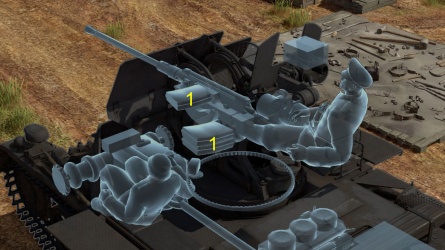
| Full ammo |
1st rack empty |
Visual discrepancy |
|---|---|---|
| 16 | 1 (+15) | Yes |
The way ammo racks work on the Flakpanzer I is very unusual. There are no ammo racks for individual cartridges of ammunition. Instead, there's a permanent ammo rack until the final cartridge is loaded into the gun, at which point all ammo racks disappear, including the one visible to be loaded into the gun, while there's still 20 bullets ready to be fired.
Usage in battles
The Flakpanzer I is an extremely versatile and potent vehicle, working largely as a glass cannon on the battlefield. It's best used as a flanker and tank-destroyer with situational use against unaware patrolling aircraft. The chassis is not particularly stable, making it more tricky to shoot on a move and easy to roll over. Turret traverse is very fast, allowing it to react to new threats and often fire the crippling shots before the enemy fully emerges from cover. While it can essentially spray 20 mm rounds at targets, it is advisable to maintain trigger control and conserve ammunition, firing only when needed because reload time between ammunition magazines is punishing, often being longer than hostile vehicles', giving them a better chance to take a second shot if the first one missed.
While the gun is great, there are some enemies it encounters that you should straight-up avoid if at all possible. These are the Valentine Mk I, B1 bis, and B1 ter. If used in 1.7 lineups, the Matilda Mk II, T-28E, and M3 Lee/Grant are also significant threats. The Flakpanzer I can opportunistically destroy the B1 bis, T-28E, and M3 Lee variations in some situations, but the B1 ter, Valentine, and Matilda are totally immune even to the APCR belt outside of lucky hits in the turret ring.
Modules
| Tier | Mobility | Protection | Firepower | ||
|---|---|---|---|---|---|
| I | Tracks | Parts | Horizontal Drive | Sprgr. | |
| II | Suspension | Brake System | FPE | Adjustment of Fire | |
| III | Filters | Crew Replenishment | Elevation Mechanism | PzGr | |
| IV | Transmission | Engine | Artillery Support | PzGr 40 | |
After researching FPE and Parts one should prioritize reaching PzGr 40 as soon as possible. The path towards it should lead through PzGr (as it significantly increases anti-tank capability over the Default ammunition belt until the PzGr 40 is researched) and Crew Replenishment, otherwise leaving it largely up to personal preference, as the Flakpanzer I largely features good mobility and accuracy.
Pros and cons
Pros:
- High penetrating gun for the rank
- High rate-of-fire
- Fast turret traverse
- Responsive handling
Cons:
- Long reload times
- Slowest among counterparts
- Nonexistent armour and survivability due to two crew and hull-break make it prone to being killed with a single shell or strafing run
History
In-game description
In early 1940, the ordnance logistics department directed the Alkett and Daimler-Benz companies to develop a weapon mount with a circular field of fire, to be mounted on the chassis of the Pz.Kpfw. I Ausf. A tank. The outdated chassis was used since the Germans were intensely seeking alternative ways to use chassis.
The Flakpanzer I had a hull, engine, transmission, and chassis which were similar to the Pz.Kpfw. I Ausf. A tank. In the modified turret box, in the place of the dismantled old turret, a 20 mm Flak 38 gun was installed on a platform. The gun had an operational fire rate of 220 rounds per minute and allowed the tank to effectively engage low-flying targets. This gun's vertical angle could range from -10 to 87 degrees.
A total of 24 of these self-propelled anti-aircraft guns were built. Two more were built with 2 cm FlaK 30 guns.
All of the Flakpanzer I guns which were released were used by the 614th flak battalion, which fought on the Eastern Front at Stalingrad. The guns were often used for direct fire support for ground troops, firing against ground targets.
One of their flaws was that the trajectory calculation was cumbersome. In order to compensate for this, folding metal sides were added, but they did not do much to remedy the situation. Therefore, attacking ground targets required 5 people, but anti-aircraft fire required a crew of 8. The anti-aircraft vehicle was protected by nothing but its front armour. Most of the ammunition was placed in a specially designed Sd.Ah.51 trailer. Communication between vehicles was carried out using signal flags, since the radio equipment had been dismantled.
The vehicle's biggest advantage was that the 20 mm anti-aircraft guns could be dismantled and installed on a platform towed behind the vehicle. These dismantling and installation procedures took 4 and 6 minutes, respectively.
Media
See also
Vehicles of comparable role, configuration and era
- Tracked
- Flakpanzer 38 (successor)
- Pvlvv fm/42
- Mk.VIA AA
- Half-truck
- Wheeled
External links
| Germany anti-aircraft vehicles | |
|---|---|
| Wheeled | Sd.Kfz.222 |
| Half-track | Sd.Kfz.251/21 · Sd.Kfz. 6/2 |
| Flakpanzer IV | Wirbelwind · Ostwind · Ostwind II · Kugelblitz · Zerstörer 45 |
| Other Flakpanzers | Flakpanzer I · Flakpanzer 38 · Flakpanzer 341 |
| Wiesel AWC | Wiesel 1A4 · Ozelot |
| Radar SPAAG | Gepard · Gepard 1A2 |
| Missile SPAA | FlaRakPz 1 · FlaRakRad |


